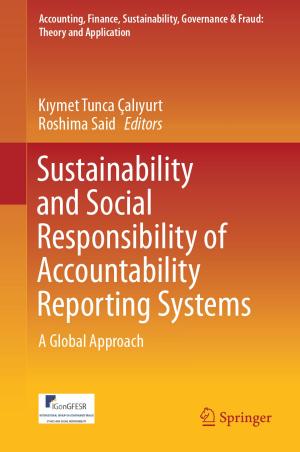The Kyoto Manifesto for Global Economics
The Platform of Community, Humanity, and Spirituality
Nonfiction, Social & Cultural Studies, Social Science, Sociology, Marriage & Family, Business & Finance, Economics| Author: | ISBN: | 9789811064784 | |
| Publisher: | Springer Singapore | Publication: | February 19, 2018 |
| Imprint: | Springer | Language: | English |
| Author: | |
| ISBN: | 9789811064784 |
| Publisher: | Springer Singapore |
| Publication: | February 19, 2018 |
| Imprint: | Springer |
| Language: | English |
This book confronts the failings of current global economics to deliver the equity, sustainability and community empowerment which humanity now needs to handle a troubled future. The volume proposes an economy built from our society, not the other way around.
The Kyoto Manifesto was built, layer by layer, over a period of 4 years, based on broad-ranging international symposia held in Kyoto between 2014 and 2017, hosted by the Center for the Creative Economy, Doshisha University. Not stopping at theory and untested ideas however, the Manifesto proposes practical action that will make a difference, including in the problematic technological and ecological context of humanity’s immediate and long-term future.
The book is unique and innovative for it moves adventurously across very broad territory. The Manifesto draws from world philosophic arguments, including, specifically, a critique of “liberalism”, further, exploring sociology, cultural anthropology, politics, primatology and early humanity, even quantum physics. Argument is set within mainstream post-1972 economics and political economics as well as direct practical experience working to empower disadvantaged communities through the United Nations.
Most importantly, the book’s analysis is deeply informed by the practice of searching for what is “sacred”, the ultimate essence of our humanity, what we can be as a human race—empowered, fulfilled individuals, deeply sharing and caring for each other across our separate cultures and lives. Stomu Yamash’ta’s On Zen performances, set the context for the Symposia, bringing different religions and cultures together across their dividing boundaries into a coherent search for peace and harmony through sacred music. Informed by alternate cultural paradigms for economics, the book probes deeply into philosophies and practices that already exist within Eastern and Western societies, and offer lessons for our future.
The result is an economics that stresses harmony with nature, and balance in social relations. It places an emphasis on community—human sharing and trust—as a platform for our future, not separate from the global economy but integrated into its very foundations. This is a book for all who care: a plan for our sustainable future built from the best of what our humanity is and can offer.
This book confronts the failings of current global economics to deliver the equity, sustainability and community empowerment which humanity now needs to handle a troubled future. The volume proposes an economy built from our society, not the other way around.
The Kyoto Manifesto was built, layer by layer, over a period of 4 years, based on broad-ranging international symposia held in Kyoto between 2014 and 2017, hosted by the Center for the Creative Economy, Doshisha University. Not stopping at theory and untested ideas however, the Manifesto proposes practical action that will make a difference, including in the problematic technological and ecological context of humanity’s immediate and long-term future.
The book is unique and innovative for it moves adventurously across very broad territory. The Manifesto draws from world philosophic arguments, including, specifically, a critique of “liberalism”, further, exploring sociology, cultural anthropology, politics, primatology and early humanity, even quantum physics. Argument is set within mainstream post-1972 economics and political economics as well as direct practical experience working to empower disadvantaged communities through the United Nations.
Most importantly, the book’s analysis is deeply informed by the practice of searching for what is “sacred”, the ultimate essence of our humanity, what we can be as a human race—empowered, fulfilled individuals, deeply sharing and caring for each other across our separate cultures and lives. Stomu Yamash’ta’s On Zen performances, set the context for the Symposia, bringing different religions and cultures together across their dividing boundaries into a coherent search for peace and harmony through sacred music. Informed by alternate cultural paradigms for economics, the book probes deeply into philosophies and practices that already exist within Eastern and Western societies, and offer lessons for our future.
The result is an economics that stresses harmony with nature, and balance in social relations. It places an emphasis on community—human sharing and trust—as a platform for our future, not separate from the global economy but integrated into its very foundations. This is a book for all who care: a plan for our sustainable future built from the best of what our humanity is and can offer.















